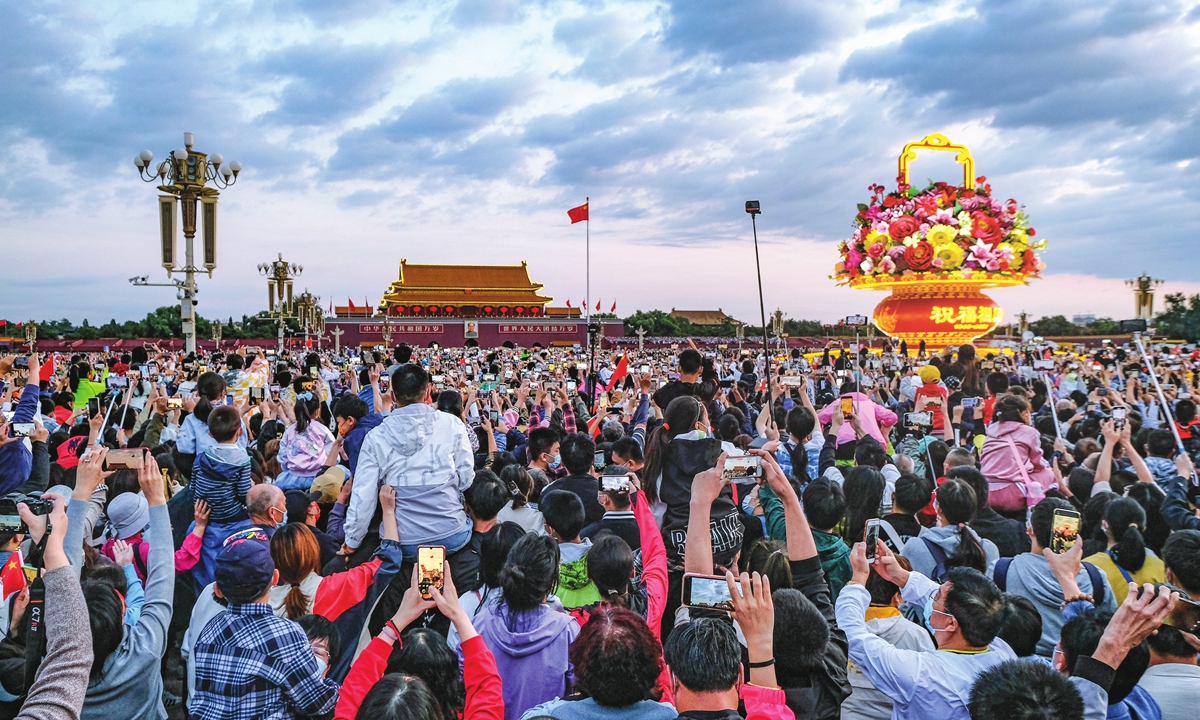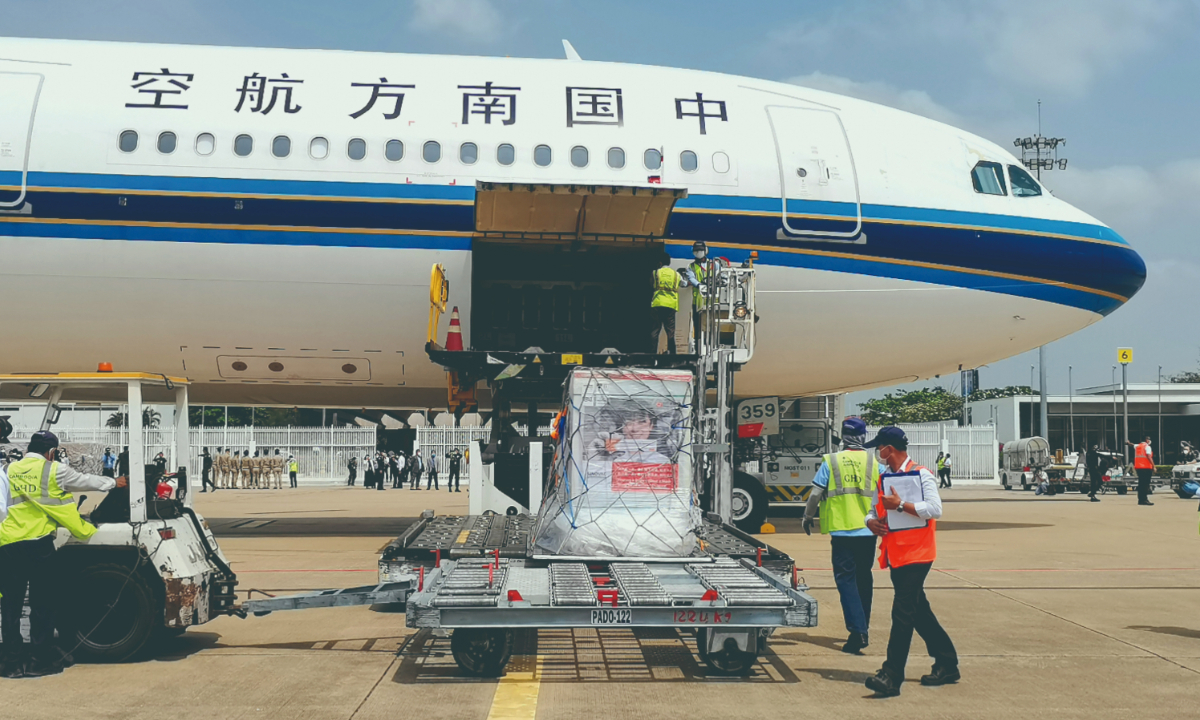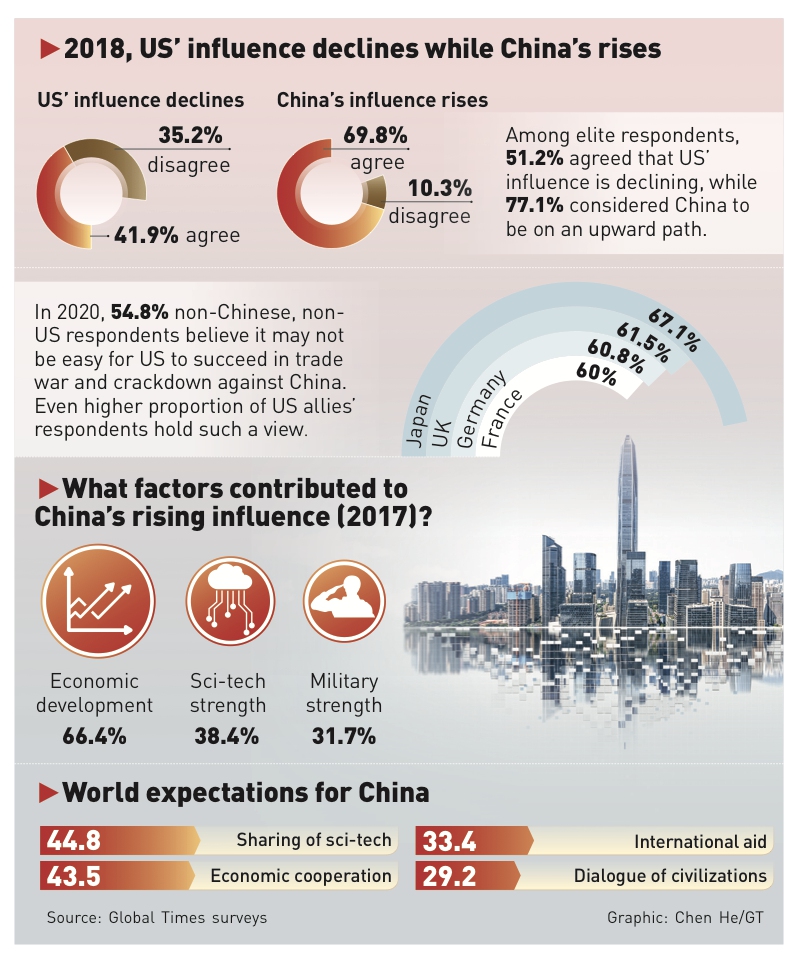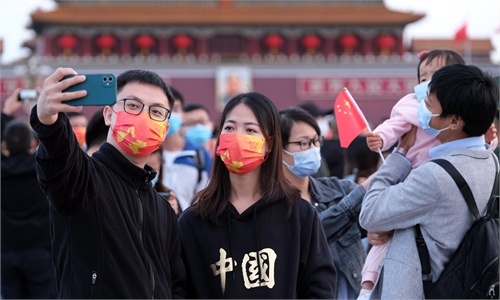
Photo: VCG
Editor's Note:
Ten years ago, when China had just become the second-largest economy in the world for three years, the world was still cautiously observing whether China could develop sustainably and some from the West were even predicting that the story of China's rise would end up with its collapse. But today, China has already become a major world power with undoubted strength and influence able to reshape the global order. Through reviewing the surveys and questionnaires done by the Global Times Research Center involving participants from around the globe in the past decade, we find that the world's recognition of China's development has increased in the past 10 years and that the world has generally recognized the strength of China. Now the world has entered another stage, which holds mixed views on how a powerful China with ambition and confidence will change the world.
"Do you think China is a world power?" This seems like a question with an easy answer today, but this is the first question of the annual global questionnaire on "China's International Image and International Position" from 2012 to 2017 done by the Global Times Research Center.
Analysts said that China was very humble and keeping low profile but eager to know how the world would evaluate and comment about its development, even though China has surpassed Japan by becoming the second-biggest economy around the globe in 2010. As the Chinese people are learning to be citizens of a great power, the world is also learning to adapt to a rising China with fast growing strengths in every aspect. From questioning the sustainability of China's development, to getting used to the fact that China is a major world power with global influence, the world has also been through a process of understanding China in the past decade.
Today, the world's views on China are complicated, with developing countries considering on how to benefit from China's development and to what extent a powerful China would like to reform the global order that's dominated by the West; the West is anxious that the unstoppable growth of China could comprehensively change the existing world order which serves the interests of a small group of countries, some of which are seeking ways for a peaceful coexistence with China, while others are pushing competition and confrontation to contain China.
Rising confidence
The Global Times Research Center has carried out surveys every year to collect data on public opinion about China from different countries across the world and also to investigate international issues related to China. These surveys have reflected the process of how the views on China around the globe changed over the past decade.
According to the 2012 surveys involving participants from major countries worldwide including the US, Russia, the UK, Brazil, India, South Africa, Japan and Germany, only 53 percent of the interviewees believed that China was a world power, and in 2017, when participants from more countries (France, Spain, Australia, Indonesia, South Korea, Ukraine and Vietnam) were involved in the surveys, 83 percent recognized China as a world power.
Zhang Yiwu, a professor at Peking University, said "This just proves that the world view of China's identity as a world power is getting deep-set around the globe," as this has become a reality especially after a clearly sustainable, convincing and successful development of the country in the first half of the past decade.
Shen Yi, a professor specializing in cyberspace and international relations at Fudan University, told the Global Times that this change in perception demonstrates that as long as people around the globe can access correct and objective information, they will inevitably be able to recognize the development of China and draw sensible conclusions.
But recognizing China's strength doesn't necessarily mean the recognition of China's political system and the path of socialism with Chinese characteristics, so when observing the rise of China, the West, which dominates the international field of public opinion, is trying to downplay the significance of China's development, analysts said.
Many Western mainstream media outlets often report news about China through a biased lens and according to their own agendas, and some Western politicians and scholars always look down upon China and smear China with false information such as "the China collapse theory," but as long as China keeps developing and showing the world its achievements, those stigmatizing will naturally fade away, according to analysts.
Shen said the answers to questions like "Do you think China is a world power" show that China needed to seek recognition from others at the beginning, but in recent years the situation has changed a lot.
"We are no longer hungry for recognition. The media outlets don't even need to explain to the world how powerful China is now. They just need to report the facts, such as China has launched its third aircraft carrier, and the world will know," Shen noted.
As China's status as a world power has become unshakable, the West is trying to use a different way to describe the rise of China to make the world become afraid of China's growing strength, analysts said.

Photo taken on March 13, 2022 shows a scene of the performance during the closing ceremony of the Beijing 2022 Paralympic Winter Games at the National Stadium in Beijing. Photo: Cui Meng/GT
Changing views
As time goes by, the questions of the Global Times surveys have also changed. In 2018, the Trump administration unilaterally launched a trade war against China, the questionnaire then no longer asked "Do you think China is a world power?" Instead it focused on the power comparison between China and the US, and which countries in the world find that they are benefiting from China's development.
From looking down upon China to exaggerating China's rising power and even demonizing China's development through "the China threat theory," the US and some of its Western allies have changed their view and strategy in dealing with the unstoppable development of China in the past decade. Experts said the US has found that because of their hegemony and unreasonable dominance in many areas, they are now facing challenges and being shaken.
The increasing recognition of China's power definitely brought on more pressure. Wang Yiwei, director of the Institute of International Affairs at Renmin University of China, told the Global Times that the survey shows a very evident fact: "If China wasn't a world power, then its development would not make the US anxious. The US wouldn't launch all-out containment and suppression operations and regulations against a country that is unable to impact its hegemony."
More importantly, the US has failed to contain China. Washington has failed in the trade war it launched and now the US economy and American citizens are paying the price for the mistakes made by those arrogant US elites, analysts said.
This is also making the rest of the world change their understanding of US hegemony. According to a 2018 survey covering 16,927 samples from 17 countries, 41.9 percent of the interviewees said that "the US influence is gradually declining" while 35.2 disagreed with such judgment. At the same time, 69.8 percent of the interviewees agreed that "China is gradually rising" while only 10.3 percent disagreed.
Among the elites, this kind of opinion was even clearer. 51.2 percent of the elite participants agreed that the US influence is gradually declining, while 77.1 percent considered China to be on a gradual upward path.
In 2019, many interviewees from both China (82.1 percent) and the US (41.2 percent) as well as other 15 countries (54.6 percent) around the globe thought the US influence to be declining, and the US image to be worsening.
In 2020, most interviewees worldwide believed that "it may not be easy for the US to succeed in the trade war and crackdown against Chinese sci-tech firms like Huawei and TikTok and China will take counter-measures."
Apart from Chinese and American interviewees, 54.8 percent of the participants from the other 14 countries held this opinion. More interestingly, those from major US allies and Western countries showed even lower confidence in the US' crackdown against China or Chinese firms, with the examples of Japan (67.1 percent), the UK (61.5 percent), Germany (60.8 percent) and France (60 percent).

The first shipment of 1.5 million doses of Sinovac COVID-19 vaccine purchased by Cambodia from China arrives in Phnom Penh on March 26, 2021. Photo:cnsphoto
Greater power, greater responsibilityThe rising power of China is not only making some in the West anxious, but also making many in the third world see the opportunity. With great power comes great responsibility. According to the global survey in 2017 that covered 16 countries worldwide, most interviewees worldwide, 66.4 percent, recognized China as a world power because of its economic strength, sci-tech strength (38.4 percent), military strength (31.7 percent), and political and diplomatic strength (30.5 percent).
In 2019, when asked about "which factors are related to China's rising international image or influence," most interviewees picked "China's rapid economic development has driven the global economy" (58.4 percent) and "Some of China's technologies (5G, high-speed railway, mobile pay, etc.) lead the world" (53.6 percent).
This just proved that in the past 10 years, China has sustained its fast model of development, producing advanced sci-tech achievements, including high-speed railways, 5G networks, as well as the fast-developing aerospace industry that benefit not only China but also the world, said analysts.
Through the Belt and Road Initiative (BRI) that was firstly proposed by China in 2013, more and more countries have received benefits from China's development not only by trade but also by infrastructure projects and sci-tech cooperation, and more and more countries, especially the developing countries, have found that China is promoting a reform to fix the problematic globalization which used to be dominated by the US and some other Western major powers, said experts.
According to the 2020 data, on the question "In which fields does your country need to further strengthen the communication and cooperation with China in the next few years," the Global Times survey found that comparing to the data from 2018, in 2020, other countries are no longer only focusing on an economic cooperation with China, but are increasingly looking forward to sci-tech cooperation with China.
For instance, 66.6 percent of interviewees from Kenya considered that they should strengthen sci-tech cooperation with China. The interviewees from Ukraine (51.3 percent), South Africa (48.9 percent), Indonesia (47.8 percent) and Egypt (45.6 percent) also shared the same opinion.
The 2020 survey found that the developing countries have higher desire to strengthen cooperation with China in economy, science and technology, and public health, while Western countries and developed countries are more eager to strengthen diplomatic ties.
The world has started viewing China differently, as now other countries have higher expectations about China, while they found the US and the West to be unable to solve the problems they care about, said Wang.
"Many Western countries can't even solve their own problems. The Biden administration has proposed the Build Back Better World plan to compete with the BRI, but many countries doubt the US' capability and determination, while the BRI has been joined by 150 countries worldwide," Wang noted.
The COVID-19 pandemic and the Russia-Ukraine crisis will surely bring a significant impact on the BRI, but in the long term, as long as China keeps developing and boosting interconnectivity between different countries and continents, the BRI is still the most reliable framework to help the world get rid of the shadow of recession and realize recovery, experts said.
Future leadership
From 2019 to 2020, the Global Times survey has started to focus on China's influence and to what extent other countries worldwide expect China to play a leading role in global governance. In 2020, due to the COVID-19 pandemic, the questions became more specific aiming to find out how the outbreak and China's epidemic control efforts would affect China's image.
In 2020, the US and some countries who failed to control the pandemic and saw huge numbers of death have launched an operation of relentless stigmatization and misinformation against China on issues like virus origins tracing, trying to blame China through what can be only described as a propaganda warfare, some countries even proposing to demand compensation from China for their losses, which in fact were caused by their failed handling of the pandemic.
This kind of ridiculous attempt to attack China has received limited effects. According to the survey in 2020 that covered 16,431 samples from 16 countries worldwide including not only the major Western countries but also non-Western regional powers like India, Indonesia, Egypt and South Africa, 56.5 percent of interviewees said they "don't hate China because of the COVID-19 epidemic breakout" while there were only 26.2 percent said "they do," and the rest said they were "not sure."
Analysts said that from the time some Western countries, especially the US, found that China has done better than them in fighting the pandemic and saving people's lives, they have refused to be humble and learn from China and fix their mistakes. Instead, they were trying their best to stigmatize China with a huge amount of misinformation to shift the blame of their failure on China, so they can still tell the fairy tale to their people that the West is still more "civilized" or "modernized" than China.
So although there are 56.5 percent of the interviewees that said they don't hate China because of the pandemic, there are also quite a lot of interviewees across the globe who have been affected by the vicious propaganda warfare launched by the US to hate China, experts said, noting that this is a key reason why in many Western countries, China's image is worsening in recent years.
However, there are still 49.2 percent of participants worldwide who said they were "surprised that China was able to effectively control the COVID-19 epidemic," while 34.9 percent of them said they were not and the rest were unsure. According to the data of the survey, it shows that the people who still hold a positive view on China are mostly from non-Western countries, while those who have negative views on China are mainly from the Western countries.
Zhang said all of this proves that in the past 10 years, China's international influence and image has generally improved, and attempts to stigmatize China are not successful. No matter how the US and other Western countries pay efforts to stigmatize China, many non-Western countries are benefiting from China whether in fighting the pandemic or realizing economic recovery, especially when Western countries show arrogant and selfish attitudes toward the developing world amid the pandemic, so they know who's really being responsible when the world is experiencing challenges.
The world is experiencing a transformation from an industrial civilization to a digital and ecological one, and China is trying to adapt to the change despite the pains caused by the pandemic, Wang noted.
Ten years ago, China desperately wanted recognition from the world. Now it has the recognition but faces another question - how to make the world believe a powerful China will not act like a Western hegemony, said analysts.
In other words, China needs to prove itself with concrete actions and to show the world that it will bring contribution, protection and certainty, rather than destruction, chaos and turbulence caused by the US, experts noted. The world is now learning to coexist and cooperate with such a powerful and confident country with a long and brilliant civilization, which will very likely become the biggest economy of the world in the next decade. Although there are still many hostilities and biases against China in some parts of the world, Chinese experts confidently said history will eventually tell the world who was right.
Liu Caiyu, Zhang Han, Wan Hengyi contributed to the story

Graphic: Chen He/GT



